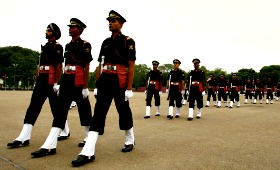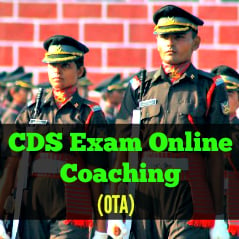CDS written exam both have sentence correction topic common in their syllabus, every year consistently questions have been asked from this topic. Sentence correction method is to make a sentence grammatically correct and structurally sound. In this article we will see Tips for General Ability CDS Exam Sentence Correction MCQs also we will share some solved example MCQs based on this topic.
Tips for General Ability CDS Exam Sentence Correction MCQs
- Read the whole sentence for structure and content:
Try to understand the entire sentence and ask two questions:
1) What is the structure of the sentence?
Means identify the subject and verb, prepositions, conjunctions, and participles because these parts are normally kept errored in the sentence.
2) What is the author trying to say?
Means sometimes a sentence is grammatically sound but the error twist the meaning of the sentence.
- Try to predict the correct answer:
Before looking into the given choices of answers try to predict the correct answer from your self after reading the errored sentence, your ability to predict the correct answer will improve with practice only.
- Dont read answer choices in same order for every question:
For a average practice candidate sentence correction MCQs can be tricky since most of the time they select answer based on their instinct/guts. In a test if a similar pattern of answer choices start occurring then it get stuck in the candidates mind say the candidates is getting option ‘a’ choice correct most of the time so he unknowingly started to focus more on option ‘a’ compare to other given choices (b,c,d). In case of sentence correction if you are going with your instinct then focus is your key and in exercise of not loosing focus it will be better if you dont read the options/choices in a same manner for every question.
- Scan through the answer choices:
Try to look for evidence in the answer choices to determine what is being tested by the question in order to pick the best answer.
- Eliminate wrong answers
If you cant find the correct choice for the sentence it will be better if you start eliminating the wrong answers. If a choice looks correct based on the given question then look for grammatical/structural error by keeping that sentence as stand alone, meaning check if you can find any error in the by not comparing it to the question.
- Read your choice back into the sentence:
Reading your choice back into the sentence will help you decide which answer communicates the meaning of the sentence most effectively and prevent you from making careless errors.
Sample Sentence Correction MCQs
Q. With just a few quick slashes of the sword, her opponents were defeated by the fencer, capitalizing on their slowness.
(A) her opponents were defeated by the fencer, capitalizing on their slowness
(B) the fencer defeated her opponents, capitalizing on their slowness
(C) the fencer capitalized on the slowness of her opponents, defeating them
(D) the fencer defeated her opponents and also capitalized on their slowness
(E) her opponents and their slowness were defeated by the fencer
Answer: B is correct, A and E are passive. This question also has to do with order of relevance. What is the most important thing the fencer did? She defeated her opponents. That should be mentioned before the fact that she capitalized on their slowness. Eliminate C. B may not appear to be parallel but it is more efficient than D. It describes
how she defeated her opponents. This is the intention of the sentence rather than listing a series of activities the fencer did. A list would require parallel structure.
Q. Since her husband began playing violin, Molly has become much more expert in distinguishing a tuned instrument and an out of tune one, a Stradivarius and a student rental.
(A) much more expert in distinguishing a tuned instrument and an out of tune one, a Stradivarius and
(B) far more expert in distinguishing a tuned instrument from an out of tune one, a Stradivarius from
(C) much more expert when it comes to distinguishing a tuned instrument and an out of tune one, a Stradivarius from
(D) far more expert in distinguishing a tuned instrument and an out of tune one, a Stradivarius and
(E) far more the expert when it comes to distinguishing between a tuned instrument, an out of tune one, a Stradivarius, and
Answer: B is correct, You distinguish a from b, or distinguish between a and b. The only option which follows either of these patterns is B.
Q. The unsupervised party seeming to be innocuous teenage fun, Judith Larkin, mother of two well-behaved daughters, thought nothing of allowing her children to attend it after the prom.
(A) The unsupervised party seeming to be
(B) As the unsupervised party was
(C) In that the unsupervised party seemed
(D) Since the unsupervised party was
(E) Because the unsupervised party seemed to be
Answer: E is correct, The use of ‘seeming’ in A is incorrect. ‘Thought’ later in the sentence places the sentence in the past tense. ‘Seemed’ is necessary. Eliminate A. The use of ‘was’ in B and D changes the meaning. The use of ‘in that’ in C is not as good as the use of ‘because’ in E. ‘Because’ establishes the reason something happened.
Q. The weather predictions delivered on television are usually reliable, but winds, storms that could not be foreseen, and ocean currents often cause much more extreme weather conditions than they had expected.
(A) storms that could not be foreseen, and ocean currents often cause much more extreme weather conditions than they had
(B) storms that cannot be foreseen, and ocean currents often cause much more extreme weather conditions than
(C) unforeseeable storms, and ocean currents are the cause of much more extreme weather conditions than they had
(D) storms that are not foreseeable, and ocean currents often cause much more extreme weather conditions than they had
(E) unforeseeable storms, and ocean currents often cause much more extreme weather conditions than they had
Answer: B is correct, This sentence simply has to have its parallel structure corrected. It begins in
the present tense, ‘are usually reliable’, so the sentence should continue in the present. Choice A is not in the present tense. ‘They’ in A, C, D and E is a pronoun without a reference.









